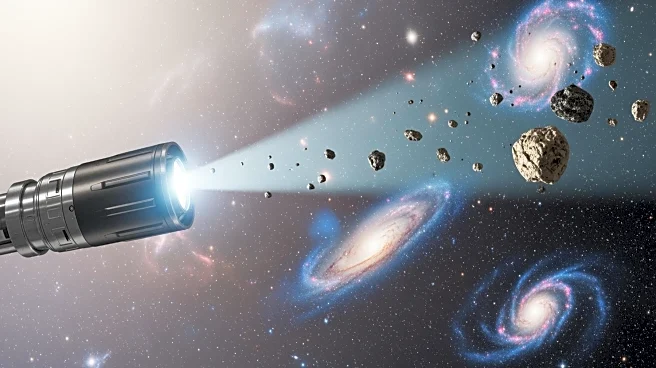What's Happening?
The ALBATOR project, a new initiative aimed at addressing the growing issue of space debris, is exploring the use of ion beams to safely move hazardous space junk without physical contact. This early-stage
concept, funded with 3.9 million Euros ($4.6 million USD), seeks to develop non-kinetic methods to redirect debris away from satellites and the International Space Station. The project is coordinated by Osmos X, a French startup, and involves collaboration with universities in Spain and Germany, as well as NorthStar, a company providing space situational awareness products. The European Innovation Council Pathfinder program supports ALBATOR, which aims to provide a safer and more versatile solution to the proliferation of debris in Earth's orbit.
Why It's Important?
The proliferation of space debris poses significant risks to satellites and space missions, threatening both commercial and scientific endeavors. The ALBATOR project's innovative approach could revolutionize how space debris is managed, potentially reducing the risk of collisions and ensuring the sustainability of space activities. By avoiding physical contact, the project minimizes the risks associated with traditional debris removal methods, such as nets or docking. This development is crucial as the number of satellites continues to grow, increasing the likelihood of debris-related incidents. Successful implementation of ALBATOR's technology could set a precedent for future space sustainability efforts.
What's Next?
The ALBATOR project is set to run for 3.5 years, with a completion date in February 2029. As the project progresses, stakeholders in the space industry will likely monitor its developments closely. The success of ALBATOR could influence future policies and strategies for space debris management. Additionally, the project's outcomes may encourage further investment in similar technologies, fostering innovation in space sustainability. A flight date for an ALBATOR technology demonstrator has yet to be announced, but its progress could significantly impact the future of space operations.
Beyond the Headlines
The ALBATOR project highlights the growing need for international collaboration in addressing space sustainability challenges. As space becomes increasingly commercialized, the responsibility for maintaining a safe orbital environment extends beyond national borders. The project's success could prompt discussions on global regulations and standards for space debris management, emphasizing the importance of cooperative efforts in preserving space for future generations.










